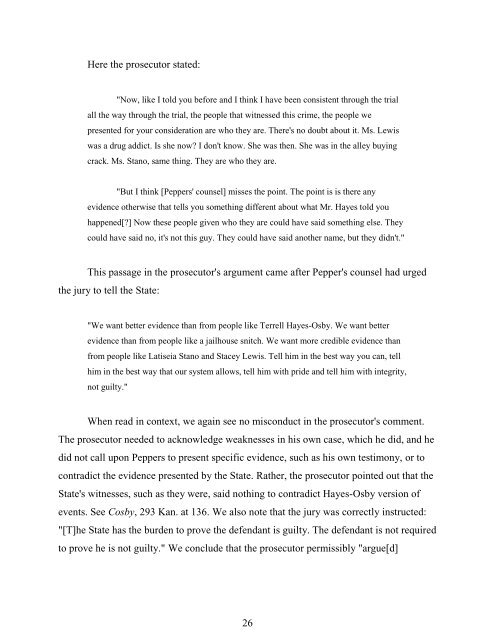Kansas Supreme Court - 101551 â State v. Peppers
Kansas Supreme Court - 101551 â State v. Peppers
Kansas Supreme Court - 101551 â State v. Peppers
Create successful ePaper yourself
Turn your PDF publications into a flip-book with our unique Google optimized e-Paper software.
Here the prosecutor stated:<br />
"Now, like I told you before and I think I have been consistent through the trial<br />
all the way through the trial, the people that witnessed this crime, the people we<br />
presented for your consideration are who they are. There's no doubt about it. Ms. Lewis<br />
was a drug addict. Is she now? I don't know. She was then. She was in the alley buying<br />
crack. Ms. Stano, same thing. They are who they are.<br />
"But I think [<strong>Peppers</strong>' counsel] misses the point. The point is is there any<br />
evidence otherwise that tells you something different about what Mr. Hayes told you<br />
happened[?] Now these people given who they are could have said something else. They<br />
could have said no, it's not this guy. They could have said another name, but they didn't."<br />
This passage in the prosecutor's argument came after Pepper's counsel had urged<br />
the jury to tell the <strong>State</strong>:<br />
"We want better evidence than from people like Terrell Hayes-Osby. We want better<br />
evidence than from people like a jailhouse snitch. We want more credible evidence than<br />
from people like Latiseia Stano and Stacey Lewis. Tell him in the best way you can, tell<br />
him in the best way that our system allows, tell him with pride and tell him with integrity,<br />
not guilty."<br />
When read in context, we again see no misconduct in the prosecutor's comment.<br />
The prosecutor needed to acknowledge weaknesses in his own case, which he did, and he<br />
did not call upon <strong>Peppers</strong> to present specific evidence, such as his own testimony, or to<br />
contradict the evidence presented by the <strong>State</strong>. Rather, the prosecutor pointed out that the<br />
<strong>State</strong>'s witnesses, such as they were, said nothing to contradict Hayes-Osby version of<br />
events. See Cosby, 293 Kan. at 136. We also note that the jury was correctly instructed:<br />
"[T]he <strong>State</strong> has the burden to prove the defendant is guilty. The defendant is not required<br />
to prove he is not guilty." We conclude that the prosecutor permissibly "argue[d]<br />
26
















